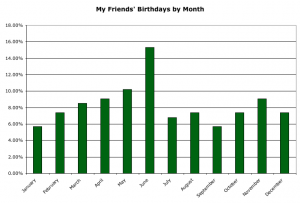Birthday Statistics
/Each spring I'm hit by a deluge of birthdays to attend. The deluge tapers off in July. This made me curious: are my friends more likely to have spring birthdays? I did some digging and found the answer: overwhelmingly, yes. First, the control group. Here are average US birthdays by month (2009 census):
As one would expect, US birthdays average 8.33% per month (as 100% divided by 12 months = 8.33%). Now, below are my friends' birthdays by month:
 Fully 25% of my friends are born in May and June. And three of my friends share my exact birthday, June 18th. When you consider the math of the Birthday Problem, this seems unlikely. What are the odds of four individuals in a set of 167 sharing the exact same birthday?
Fully 25% of my friends are born in May and June. And three of my friends share my exact birthday, June 18th. When you consider the math of the Birthday Problem, this seems unlikely. What are the odds of four individuals in a set of 167 sharing the exact same birthday?
By way of control group, only two of my other 167 friends share the same birthday with each other.
DATA SET
To obtain the data above, I took my total set of Facebook friends and parsed 180 that I feel a genuine connection with (as many Facebook friends are acquaintances). Of 180 friendships, I was able to scrape birthday data for 176 of them. Creating the chart above.
THE BIG QUESTIONS
Why am I nearly twice as likely to have a friend born in the spring than the summer? Why am I nearly three times as likely to have a friend born in June as a friend born in January?
Is this random chance or do other people notice trends among their friends as well?
THE SCIENCE OF BIRTHDAYS
Turns out, science has spotted many birthday correlations, none of which are properly understood. For instance, children with autism are 16% more likely to be born in winter months. 1 Spring babies are at a 17% higher risk of suicide.2 A mother's exposure to sunlight (read: vitamin D levels) during gestation may be a significant factor in fetal development. For instance, both MS and Schizophrenia are strongly correlated to babies who came to term during winter months, or in northern latitudes with lower levels of sunlight.1 2 If vitamin D can have such a marked effect on fetal health and development, is it possible that brain and personality may be effected as well? Since photoperiodism can effect the brain chemistry of adults (fully 10% of Alaskans suffer from Seasonal Affective Disorder), can daylight itself be a factor?
Other bizarre birthday statistics:
* US teen mothers are more likely to give birth in January than any other month 3 * February babies have a higher likelihood of narcolepsy 4 * Pilots are more likely to be born in March 4 * People with autumn birthdays have the longest lifespans; spring birthdays have the shortest. A person born in October will outlive a person born in March by an average of 215 days.4 * June and July babies consistently have the highest likelihood of short-sightedness4 *September babies get the best grades and test scores in school.4
Conclusions
I think astrology is malarkey. But is it possible that birth month affects personality? Is my statistical sample of 167 friends simply too small to be meaningful? It is interesting to me that among my very best friends, spring babies are still over-represented, with a distribution mirroring the chart above. Possibly science will begin to formulate explanations for the statistical correlations between birth date and personality, health, and aptitude.
